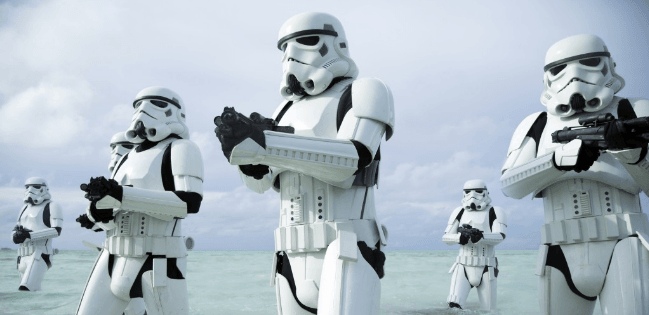
We’re just a few days out from the release of ‘Rogue One: A Star Wars Story’, and while interest in the franchise’s first anthology film is running high, not everyone is looking forward to the film. Beyond the expected grumblings of particularly obsessive or pedantic fanboys, there has also been an outcry among the so-called “alt-right”.
About a month ago, ‘Rogue One’ writer Chris Weitz tweeted a number of comments expressing his displeasure with President-elect Donald Trump. One of those tweets (which has since been deleted) drew a connection between Trump’s popularity among alt-right (a strand of conservative thought strongly associated with racist, xenophobic and misogynist thought) circles and ‘Star Wars’, saying “Please note that the Empire is a white supremacist (human) organization”. In and of itself, this would seem a fairly uncontroversial statement. After all, you don’t need to agree with Weitz’s politics to recognize that the Empire has long been depicted as exactly that. In fact, while it was never explicitly stated in the films, the fact that in addition to being a fascist state, the Empire also implemented a number of sexist and racist (here meaning “anti-alien”) policies was a very well established part of the pre-Disney Expanded Universe (now dubbed the Legends continuity). Regardless, Weitz has since deleted the offending tweet and issued an apology.
But this is the internet, where apparently some people have spent the last forty years failing to notice that the “evil Galactic Empire” (as described in the first film’s opening crawl) is made up of the saga’s villains. In the wake of these remarks, right-wing Twitter users have called for a boycott of ‘Rogue One’. In doing so, they have variously described the film as “anti-Donald Trump” and “feminist propaganda”.
When THR asked about the “issue” at the red carpet premiere of ‘Rogue One’, Disney CEO Bob Iger had this to say:
“I think the whole story has been overblown and, quite frankly, it’s silly. I have no reaction to [this] story at all. Frankly, this is a film that the world should enjoy. It is not a film that is in any way, a political film. There are no political statements in it at all. [‘Rogue One’] has one of the greatest and most diverse casts of any film we’ve ever made and we are very proud of that, and that is not a political statement, at all.”
Of course, this isn’t the first time a ‘Star Wars’ film has garnered this sort of controversy. The individuals describing ‘Rogue One’ as “feminist propaganda” call to mind similar objections that surfaced around last year’s release of ‘The Force Awakens’, which were also driven by the fact that the film featured a female lead. And back in 2005, ‘Revenge of the Sith’ drew complaints, again from the right, when some felt the film echoed liberal criticisms of then-President George W Bush. George Lucas himself answered those criticisms by pointing out that the film’s story had been conceived decades prior, and was more directly influenced by the transition of Ancient Rome from Republic to Empire than by anything in contemporary American politics. At the end of the day, if you see your favorite politician reflected in a film’s villains, it might be worth taking a hard look in the mirror before trying to translate hashtags into boycotts.
Frankly, that this is even an issue (and apparently a perennial one at that) speaks to an astonishingly deep-rooted persecution complex among certain strains of American conservatism. To be perfectly clear, it is absolutely okay to be politically conservative. It is also perfectly okay to not like a given movie. What’s not okay is throwing a Twitter fit when a new film in a franchise has a female lead or when a writer compares the villains of the movie to real life villains, especially when the comparison is hardly unprecedented. Diversity is not a bad thing. That should not be a controversial statement.
Directed by Gareth Edwards, ‘Rogue One’ chronicles the events leading up to the original 1977 ‘Star Wars’ film, following a group of Rebel spies who find themselves tasked with stealing the plans to the Death Star and delivering them to the Alliance.
‘Rogue One: A Star Wars Story’ will open in theaters on December 16, 2016, almost exactly a year after the release of ‘The Force Awakens’. The film stars Felicity Jones, Diego Luna, Ben Mendelsohn, Donnie Yen, Riz Ahmed, Mads Mikkelsen, Jiang Wen, Alan Tudyk, Jimmy Smits, and Forest Whitaker.
You can find a review by our very own Dave Taylor here.
